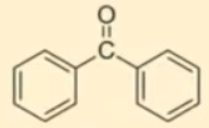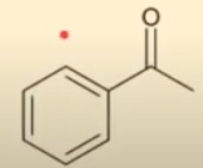which of the following is most reactive towards nucleophilec addition reaction ?




To determine which compound is most reactive towards nucleophilic addition reactions, we need to analyze the reactivity of aldehydes and ketones based on their structure and steric factors.
1. Identify the Types of Compounds:
- In the question, we have various compounds, including aldehydes and ketones. Aldehydes have the general structure RCHO, while ketones have the structure RC(=O)R'.
2. Understand Nucleophilic Addition:
- Nucleophilic addition reactions involve a nucleophile attacking an electron-deficient carbon atom, typically the carbonyl carbon (C=O) in aldehydes and ketones.
3. Reactivity of Aldehydes vs. Ketones:
- Aldehydes are generally more reactive towards nucleophilic addition than ketones. This is because:
- Electron Density: In ketones, there are two alkyl groups attached to the carbonyl carbon. These groups donate electron density to the carbonyl carbon, making it less electrophilic (less positive) and thus less reactive towards nucleophiles.
- Steric Hindrance: Aldehydes have one hydrogen and one alkyl group, which results in less steric hindrance compared to ketones. This allows nucleophiles to approach and attack the carbonyl carbon more easily.
4. Evaluate the Given Options:
- If we have options that include both aldehydes and ketones, we need to identify which one is an aldehyde and which ones are ketones.
- For example, if the options include:
- Benzophenone (ketone)
- Acetone (ketone)
- Acetaldehyde (aldehyde)
- Another ketone (e.g., butanone)
- We can see that acetaldehyde (CH3CHO) is an aldehyde.
5. Conclusion:
- Since aldehydes are more reactive than ketones towards nucleophilic addition, the most reactive compound among the options provided is acetaldehyde (CH3CHO).
Final Answer:
The most reactive compound towards nucleophilic addition is acetaldehyde (CH3CHO).
- In the question, we have various compounds, including aldehydes and ketones. Aldehydes have the general structure RCHO, while ketones have the structure RC(=O)R'.
- Nucleophilic addition reactions involve a nucleophile attacking an electron-deficient carbon atom, typically the carbonyl carbon (C=O) in aldehydes and ketones.
- Aldehydes are generally more reactive towards nucleophilic addition than ketones. This is because:
- Electron Density: In ketones, there are two alkyl groups attached to the carbonyl carbon. These groups donate electron density to the carbonyl carbon, making it less electrophilic (less positive) and thus less reactive towards nucleophiles.
- Steric Hindrance: Aldehydes have one hydrogen and one alkyl group, which results in less steric hindrance compared to ketones. This allows nucleophiles to approach and attack the carbonyl carbon more easily.
- If we have options that include both aldehydes and ketones, we need to identify which one is an aldehyde and which ones are ketones.
- For example, if the options include:
- Benzophenone (ketone)
- Acetone (ketone)
- Acetaldehyde (aldehyde)
- Another ketone (e.g., butanone)
- We can see that acetaldehyde (CH3CHO) is an aldehyde.
- Since aldehydes are more reactive than ketones towards nucleophilic addition, the most reactive compound among the options provided is acetaldehyde (CH3CHO).
The most reactive compound towards nucleophilic addition is acetaldehyde (CH3CHO).
Similar Questions
Knowledge Check
Which of the following is most reactive towards nucleophilic addition reactions ?
ACH3COCH3BCH3CHOCCH3COC2H5DHCHOWhich of the following is most reactive towards nucleophilic addition reactions ?
ACH3COCH3BCH3CH2COCH2CH3CPh−C∣∣O−CH2DPh−C∣∣O−PhWhich is most reactive towards nucleophilic addition reactions?
AEthyl acetateBAcetic anhydrideCAcetamideDAcetyl chloride
Which of the following is most reactive towards nucleophilic substitution reaction?
View SolutionWhich of the following is most reactive toward nucleophilic substitution reaction ?
View SolutionWhich one of the following is most reactive towards nucleophilic substitution reaction ?
View SolutionWhich of the following is most reactive towards nucleophilic substritution reaction?
View SolutionWhich one is most reactive towards nucleophilic addition reaction?
View Solution
